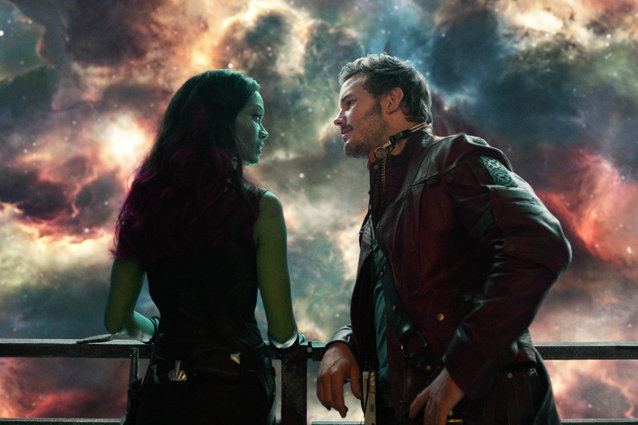 Walt Disney Pictures/Marvel
Walt Disney Pictures/Marvel
The summer movie season is changing. What used to be a predictable tide of releases, with wanes and surges at certain spots on the calendar, has become a far less predictable swell of films. Captain America: The Winter Soldier opened in April, way ahead of the usual start of the season, and while big blockbusters are beginning to creep further back into the spring, they are also creeping ahead, later and later into the summer as well. While the month of August usually sees the big summer releases starting to wind down, this August features one of, if not the biggest film releases of the year. Marvel’s space epic Guardians of the Galaxy is hitting theaters August 1, and will be the first Marvel studios film to be released in the late summer month.
So what’s happening here? Is the summer movie season just expanding out from its traditional boundaries? There’s certainly a case to be made for that conclusion. August 2014 may be the biggest August for blockbuster movies ever: along with Guardians of the Galaxy, the Michael Bay-produced Teenage Mutant Ninja Turtles, Sin City: A Dame to Kill For, and The Expendables 3 are all being released this August. Compare this to August 2013, where the two biggest releases were Kick-Ass 2 and We’re the Millers, two R-rated movies that don’t nearly have the same mass appeal as something like Teenage Mutant Ninja Turtles or Guardians of the Galaxy. It’s possible that we’ve reached a point of saturation for these films, where it doesn’t make sense to cram your hundred million dollar production into June or July where it can be easily cannibalized by other hundred million dollar films. Last year, big productions like After Earth, White House Down, R.I.P.D, and The Lone Ranger all struggled to recoup their budgets while competing in May, June, and July. Why not spread out into months with less traffic? 2011’s Rise of the Planet of the Apes premiered in August of that year, and did surprisingly well in a month not known for launching blockbuster franchises. But the surprise success of of that film brings up an even bigger question: Does the summer movie season even matter anymore?
In the past few years, several films have proved that there is a lot of money to be made at the box-office outside of summer. Just this year, Captain America: The Winter Soldier opened to a $96 million dollars at the beginning of April, a solid month before Memorial Day weekend. Elsewhere, the Hunger Games franchise has proved that it’s possible to make summer blockbuster money in November, with the second installment in the series grossing $158 million on its opening weekend. That film went on to become the tenth highest grossing film of all time in the U.S. It’s becoming increasingly apparent that the time of the year a film releases isn’t nearly as important as the film itself, and that people will chase down tentpole movies regardless of their spot on the calendar. Would the Hunger Games: Catching Fire have done any better had it been released in May 2013 alongside Iron Man 3? It’s much more likely that both films would have done worse.
Despite the long-standing tradition, it’s becoming increasingly clear that crowding most of the year’s spectacle-laden blockbusters into a small handful of summer weekends doesn’t make sense anymore. There are just two many movies clogging up the summer while other parts of the year lay untouched. Studios think blockbusters have to come out during the summer because that’s how it has always been, but audiences are proving that they’ll line up at any time of the year to watch Captain America save the day.


